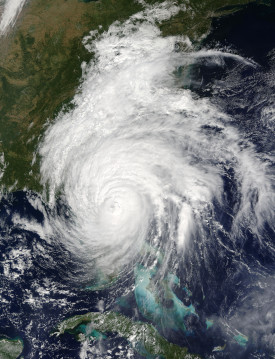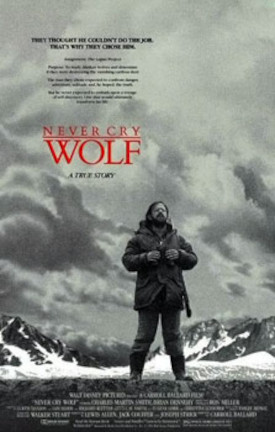Beyond the Headlines
Air Date: Week of September 29, 2023

There is a nation-wide blood shortage due in part to natural disasters preventing Americans from donating blood, according to the American Red Cross. (Photo: ec-jpr, Flickr, CC BY ND-NC 2.0)
This week, Living on Earth Contributor Peter Dykstra joins Host Aynsley O’Neill to warn of how climate disasters are hitting the national blood supply. Also, weather disasters hit 90% of US counties in the last decade. And in history, a 40 year anniversary of the release of a nature movie called “Never Cry Wolf” about a scientist’s change of heart about wolves.
Transcript
O’NEILL: And I’m Aynsley O’Neill. It's time now for a look beyond the headlines with Peter Dykstra. He's our Living on Earth contributor from Atlanta, Georgia. Hey there, Peter, what do you have for us this week?
DYKSTRA: Hi, Aynsley. The American Red Cross says that the blood supply available in the United States is at critically low levels. And one of the reasons they say why it's at critically low levels is climate change.
O'NEILL: That doesn't sound so good, Peter, what's going on there?
DYKSTRA: Well, it's not as if we don't have enough lovely things to think about with climate change. But what the Red Cross and other organizations have said, is that patients don't stop getting sick when there's a natural disaster. But they do stop giving blood. And that's created a crisis that hits hard every time the Red Cross has already been called into action, to help deal with the wildfire, or the hurricane or flood, or any of the many, many things that they do to help Americans out of disaster. The blood supply is one of the most important and it's getting smacked by climate change as so many other things are.
O'NEILL: Sounds like one disaster turns into another disaster compounding into another disaster, Peter, not a very good cycle.
DYKSTRA: Not at all.
O'NEILL: All right. Well, Peter, what else do you have for this week?

Hurricane Matthew (2016) looms large over the east coast of the United States, one of the hardest-hit regions for natural disasters between 2011 and 2021. (Photo: NASA Goddard Space Flight Center, Flickr, CC BY 2.0)
DYKSTRA: Another item about the climate crisis. 90% of US counties had a weather disaster between the years 2011 and 2021. That according to a recent report, and website called Atlas of Disaster. You can go online and see the counties that have had disasters. Some counties, as many as 12. And it's really an eye-catching way to show that nearly all of us have been impacted by climate change in the last decade or so.
O'NEILL: 90% is hard to fathom. I mean, who even got spared over that last decade?
DYKSTRA: A lot of sparsely populated western counties in places like Wyoming and Nevada had no disasters to speak of in that decade ending in 2021.
O'NEILL: Now, Peter, what do you have for us from the history books this week?
DYKSTRA: Something that happened 40 years ago. October 7, 1983. There was a wonderful, although sparsely seen, nature movie called Never Cry Wolf. It was released and based on the memoirs of the nature writer Farley Mowat, a great Canadian writer, The film tells the story of a Canadian government scientist sent to study the menace of wolves, only to find out that they didn't need to be regarded as a menace. He was absolutely enchanted with wolves. That main character is played by Charles Martin Smith.

October 7, 2023 marks the 40th anniversary of the nature-drama film Never Cry Wolf, starring Charles Martin Smith. (Photo: Internet Movie Poster Awards, Wikimedia Commons, Fair Use)
O'NEILL: Charles Martin Smith. Why does that name sound familiar, Peter? What else would I know him from?
DYKSTRA: He was a supporting player in a couple of hit movies in the 70s and in the 80s. He was one of the high school kids coming of age in American Graffiti. And in the 80s, he played a government accountant who helps unravel the finance behind Al Capone and gets him locked up for income tax evasion.
O'NEILL: So should I put those on my list as a triple feature for homework, Peter? American Graffiti, The Untouchables, Never Cry Wolf?
DYKSTRA: Start with Never Cry Wolf.
O’NEILL: Okay, and add the other two later. All right. Well, thank you, Peter. Peter Dykstra is a contributor to Living on Earth, and we will talk to you again real soon.
DYKSTRA: All right, Aynsley. Thanks a lot. Talk to you soon.
O'NEILL: And there's more on the stories on the Living on Earth website. That's LoE.org.
Links
E&E News by Politico | “How Global Warming is Worsening a National Blood Shortage”
Yale Climate Connections | “90% of U.S Counties had a Weather Disaster Between 2011 and 2021”
Living on Earth wants to hear from you!
Living on Earth
62 Calef Highway, Suite 212
Lee, NH 03861
Telephone: 617-287-4121
E-mail: comments@loe.org
Newsletter [Click here]
Donate to Living on Earth!
Living on Earth is an independent media program and relies entirely on contributions from listeners and institutions supporting public service. Please donate now to preserve an independent environmental voice.
NewsletterLiving on Earth offers a weekly delivery of the show's rundown to your mailbox. Sign up for our newsletter today!
 Sailors For The Sea: Be the change you want to sea.
Sailors For The Sea: Be the change you want to sea.
 The Grantham Foundation for the Protection of the Environment: Committed to protecting and improving the health of the global environment.
The Grantham Foundation for the Protection of the Environment: Committed to protecting and improving the health of the global environment.
 Contribute to Living on Earth and receive, as our gift to you, an archival print of one of Mark Seth Lender's extraordinary wildlife photographs. Follow the link to see Mark's current collection of photographs.
Contribute to Living on Earth and receive, as our gift to you, an archival print of one of Mark Seth Lender's extraordinary wildlife photographs. Follow the link to see Mark's current collection of photographs.
 Buy a signed copy of Mark Seth Lender's book Smeagull the Seagull & support Living on Earth
Buy a signed copy of Mark Seth Lender's book Smeagull the Seagull & support Living on Earth

